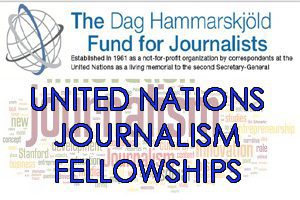Application Deadline: March 16, 2015.
The Dag Hammarskjöld Fund for Journalists is now accepting applications from professional journalists from developing countries for its 2015 fellowship program.
The fellowships are available to radio, television, print and web journalists, age 25 to 35, from developing countries who are interested in coming to New York to report on international affairs during the 70th session of the United Nations General Assembly.
The fellowships will begin in early September and extend to late November and will include the cost of travel and accommodations in New York, as well as a per diem allowance.
Eligibility Criteria
The Dag Hammarskjöld Fund for Journalists fellowships are open to individuals who:
- Are native of one of the developing countries of Africa, Asia, Latin America and the Caribbean. For 2014 only, the Fund will not accept applications from the countries of the 2014 Fellows – Nigeria, Tunisia, the Philippines, and Vietnam — in an effort to rotate recipient countries.
- Currently live in and write for media in a developing country.
- Are between the ages of 25 and 35.
- Have a very good command of the English language since United Nations press conferences and many documents are in English only.
- Are currently employed full-time as professional journalists for print, television, radio or internet media organizations.
- Have approval from their media organizations to spend up to three months in New York reporting from the United Nations.
- Receive a commitment from their media organizations that the reports they file during the term of the Fellowship will be used and that they will continue to be paid as employees.
Benefits:
- Four journalists are selected each year after a review of all applications.
- The journalists who are awarded fellowships are given the incomparable opportunity to observe international diplomatic deliberations at the United Nations, to make professional contacts that will serve them for years to come, to interact with seasoned journalists from around the world, and to gain a broader perspective and understanding of matters of global concern.
Documentation Requirements
Please include all of the following documents with your signed application. Applications WITHOUT the following documents will NOT be considered.
1. Copies of representative selections of your work, such as newspaper clippings, audio tapes, video tapes or internet submissions. The selections must be work produced in 2013 or 2014 — not earlier. Entries with insight and originality will be considered most favorably. Investigative work is welcome.
- For newspaper clippings not in English, include an English translation or summary.
- For audio tape and video tape submissions, include a written transcription or a summary in English, even if the originals are in English.
- Video submissions should be in DVD or CD (preferably NTSC) format. Radio applicants should send a CD with MP3 formatted files.
2. Signed letters from two individuals who supervised you and can comment on your journalism experience and qualifications.
3. Endorsement of the Fellowship application from the editor or director of the news organization that presently employs you. This endorsement must be originally signed and should:
- Grant you a leave of absence from your current duties in the event you are awarded a fellowship.
- Agrees to continue paying you as an employee during the term of the fellowship and plans to use the reports you file from the U.N.
- States plans for using the reports you file during the fellowship.
4. Summary statement. On a separate sheet of paper, explain in not less than 300 words why you are applying for this Fellowship and what you expect to gain from the experience.
5. Two recent photographs (passport size or larger). Place these photos in a separate secure envelope and affix them to the front of your application. Do not staple the photos directly to the application form.
6. A copy of your passport.
For More Information:
Visit the Official Webpage of the 2015 United Nations Dag Hammarskjöld Fund for Journalists

